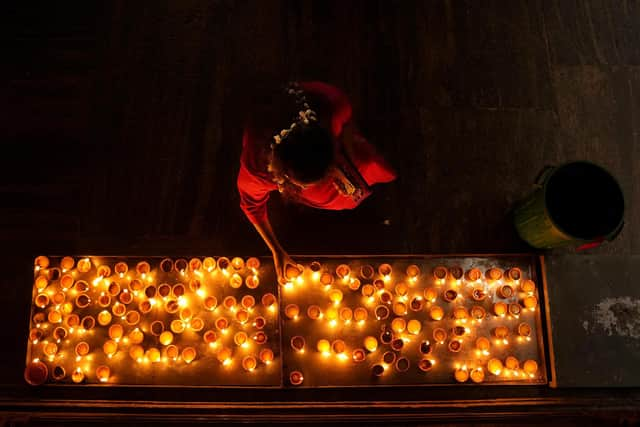Diwali 2021: What is the meaning of Diwali, when is it and what celebrations are taking place in Sheffield
and live on Freeview channel 276
But what is Diwali, when is it and what celebrations are taking place?
Every year, Diwali, also known as the festival of lights, is observed for five days.
Advertisement
Hide AdAdvertisement
Hide AdAlso known as Divali or Deepavali, it is a major festival celebrated in many parts of India and now the rest of the world by people of different faiths including many Hindus, Sikhs, Jains and some Muslims and Buddhists.


The festival is held every year between October and November, with the exact date varying from year to year.
This year's festival will take place from November 2 to 6, with today (November 4) being the most significant day.
Many Hindus celebrate Diwali by burning 'diyas' or little oil lamps in honour of Lakshmi the goddess of riches and fortune. The lamps represent light triumphing over darkness and evil.
How is Diwali celebrated?
Advertisement
Hide AdAdvertisement
Hide AdThe five-day holiday originated in the Indian subcontinent. Dhanteras, the Hindu goddess of wealth, prosperity, youth, and beauty, is honoured on the first day. Celebrants usually buy new jewellery, apparel, and utensils, and light lights to welcome Lakshmi.
They also prepare by cleaning their homes and making decorations on the floor such as rangolis, made using coloured fine powder or sand.
The second day is also known as Chhoti Diwali, Naraka Chaturdasi or Kali Chaudas where it commemorates the divinity Krishna's victory over the evil god Narakasura in Hindu mythology. Some people put up glittering lights to honour his victory on this day.
The most significant day of the Diwali festival is on the third day where celebrants gather with family and friends to feast and exchange sweets and presents. People continue to light lamps and candles to welcome the goddess Lakshmi's blessings of light and prosperity.
Advertisement
Hide AdAdvertisement
Hide AdOn the fourth day, some Hindus in northern India make little heaps of cow dung, known as Govardhan Puja or Padva, as a symbol of how Krishna overcame the Hindu gods' king, Indra, by pulling up a mountain.
The fifth day, known as Bhai Dooj or Yama Dwitiva, is a day for brothers and sisters to commemorate one another as they pray for each other. On this day, people typically set off fireworks to celebrate Diwali's final day.
What celebrations are taking place in Sheffield?
Sheffield Students' Union is hosting a Diwali Party 'Agni' on November 6 at Onyx Nightclub Sheffield on Rockingham Street in the city centre.
Dubbed to be the 'biggest and baddest Bollywood night of the year', the event will be a night full of entertainment, socialising, and dancing to hit Bollywood and Indian music.
Advertisement
Hide AdAdvertisement
Hide AdThe event starts at 11pm with the last entry at 12.30am and tickets are priced at £5 each.
Wristbands can be collected at the Diamond Cafe from 3pm to 5pm (Tuesday to Friday).
Visitors need to have a valid NHS Covid Pass that shows a negative lateral flow test or a PCR test or proof of double vaccination.
For more information, please visit here. https://su.sheffield.ac.uk/events/id/487-agni-diwali-party